Another 10 books on digital transformation that are worth reading. (2017-2019)
When paper helps to understand the digital transformation.
Two years have almost passed since I published the blog post 10 books on digital transformation that are worth reading which I have been – and still am.
And because we are constantly receiving and utilising better books, more up-to-date and more comprehensive information in a networked world, the time has come to present another ten books that help us understand the digital transformation.
Please: Anyone who misses a book that should have been listed here – please let me know, because these ten books mentioned here also showed me that I still want to understand and know far more about it.
1 A brief history of digitalisation
Martin Burckhardt, Munich 2018
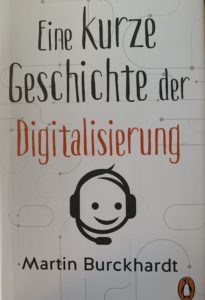
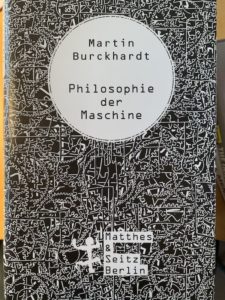
This slim little book by cultural historian Martin Burckhardt is a minor sensation. In just under 250 pages, it traces a cultural and scientific-historical development of digitising ideas that is quite different from other books on the subject: a new view of the developing digital world is developed using a wide variety of episodes, in which the Abbe Jean-Antoine Nollet plays just as much a role as Mary Shelley's gruesome story finds its very down-to-earth explanation: I won't be upset about German Christmas markets any more when I know that they once publicly stuck wires into the severed heads of animals and people for „electrical magic“!
Martin Burckhardt takes an approach to explaining digitalisation that traces it back so far that we cannot pinpoint its origins. In any case, it's not as if a few clever or bored people got up one morning in the 20th century and thought to themselves, let's give them a good heating up so that they get out of breath.
For Burckhardt, digitalisation is a Consistency of curiositywhich is deeply embedded in our humanity. It does not have the appearance of the unnatural at all. Instead of thinking in terms of technologies and computer machines, Burckhardt is concerned with recognising the Digitalisation as a parlour game that connects us all, brings us closer and allows us to come to terms with ourselves as human beings. It is not a national project. It is not a project of the Europeans or the Americans or the Chinese or the shield citizens. Digitalisation brings us together as people, so that we have no choice but to deal with our foreign sides and strangers. That is why it must also tear down borders.
It is – quite contrary to some excited voices in the arts pages and interpretation industries – a profoundly humanistic project and a consequence of our efforts in dealing with communication, i.e. the potential for co-operation and conflict among ourselves. If the defining concept of the 20th century was communication, in the 21st century it will be information. We will come back to this at the end.
And that is the essence of the „Little Burckhardt“ – as I now call the booklet.
The Great Burckhardt („Philosophy of the Machine“) is already on the reading table. (To be continued.)
2. how the world came into the computer.
On the emergence of digital reality
David Gugerli Frankfurt am Main 2018
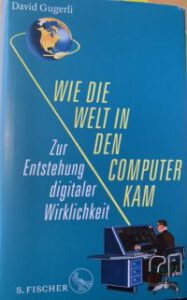
Today, we open our laptops, take photos with our smartphones, get upset about our internet connections (in Germany), call for Smoothness, ease of handling and lightness – and all this with storage capacity, speed and super simplicity. The digitalisation and other advances of the last 30 years are such incredible changes that when we have problems in life, we think of some error in the matrix. Even those who have it easy only feel obstacles and brakes.
But what was that The mammoth task of getting the world into the computer! We hardly realise what adaptations, adjustments and sections were necessary in order to be able to communicate worldwide and at any time. In his – small – booklet, Gugerli attempts to familiarise late-borns with these difficulties. It is a highly interesting attempt.
I only understood half of the problem, I think.
The other half was still worth it!
Be sure to read – before the robots and cobots, Siris and Alexas, Amelia's and Atlases come back into the world!
3. the age of surveillance capitalism
Shoshana Zuboff, Frankfurt am Main 2018
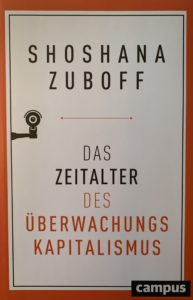
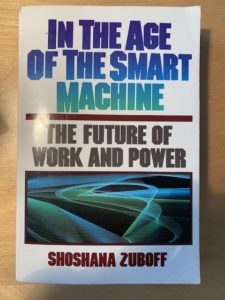
Shoshana Zuboff is an American economist, long-time professor at the Havard Business School and is considered one of the most original economic thinkers in the world. She played a key role in shaping the debate on the emergence of digitalisation with her Standard work „In The Age Of The Smart Machine – The Future Of Work And Power“which already in 1988 Changes in the world of work and business saw the sun rise.
In her new book, 700 closely written pages, she takes stock of the developments of the digitally driven economy: she describes the changed ways in which the economic and working world functions, in which data is collected and analysed comprehensively and on a daily basis. She sees these changes as a new form of capitalism and describes it as Surveillance capitalism.
She sees the special features above all in the private-capitalist starting point the all-encompassing definition of people, their actions and economic activities, their thoughts and beliefs – entirely in the service of the digitalised society, in which individuals appear as accessories to the digital machinery and are subject to a new kind of reward and punishment system.
Zuboff is preoccupied with important questions:
- How is the global, or at least social, community of people ensured if people are useless as labourers but indispensable as data carriers and sources?
- Can individual data sovereignty make up for the loss of status as a labour force?
- What new powers are emerging in this game?
- What kind of society will be created by these developments? How will liberal democracy assert itself? Will it be able to?
The work is a treasure trove of knowledge. Admittedly, one can criticise its dramatic nature and point to the beginnings of capitalism, in which private corporations amassed quasi-state power and brutally and inhumanely pursued world trade and the colonisation of conquered territories. In view of the „company histories“ e.g. of the Dutch stock corporation „Vereenigde East India Company (VOC)“ or the „British East India Company“, the – and not the British Empire – conquered the Indian subcontinent, the excitement surrounding AGFA & Co. seems rather exaggerated. On the other hand, it cannot be claimed that everything went well back then.
For me, the value of the book lies above all in the detailed descriptions of how digital capitalism works, the disruptive effects compared to industrial capitalism, why the platform economy is as ingenious as it is dangerous – and that above all the (globally orientated) legislator is called upon to act for the benefit of all. And this legislation affects us all, as the GDPR spearheaded last year. Effective legislation will also affect or at least have an impact on direct user behaviour.
4. attack of the algorithms.
How they manipulate elections, destroy career opportunities and jeopardise our health
Cathy O’Neil, Frankfurt am Main 2018
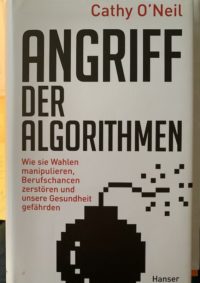
Cathy O’Neil is a Harvard-educated mathematician who used to be a hedge fund manager and is now involved in the Occupy Wall Street movement. She coined the term „Weapons of Math Destruction“ (WMDs), not without reason to the Weapons of Mass Destruction should remember. There are certainly not many people in the world who can write and explain the fatal effects of algorithms in such a well-founded and understandable way. In many ways, the book and its background reminded me of Yvonne Hofstetterwhose books („You know everything!“)were published in the first Post „10 books on digitisation that are worth it…“ were mentioned.
In her book, O’Neil notes countless examples in which loans were wrongly refused, job applications were rejected in a discriminatory manner, police measures were carried out unlawfully, in short; in which algorithms „made decisions “ and the people involved regarded and defended them as objective, incorruptible and correct. But, and this is O’Neil's core message, algorithms are not objective.
Cathy O‘ Neil is not advocating total rejection, which is mostly fuelled by a lack of knowledge, but rather for a healthy scepticism, that always keeps an eye on the benefits of technological developments.
5 What should we think of artificial intelligence?
The leading scientists of our time on intelligent machines.
John Brockman (ed.), Frankfurt am Main 2018
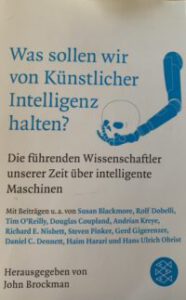
John Brockman is not just anyone, but a celebrated performance artist and zeitgeist who has made a name for himself as a literary agent in recent years. He also gives the Internet-Zeitschrift „Edge“ out. And from time to time he comes up with a provocative „Edge-„Frage which he poses to the world's leading minds. This is also how „What should we think of artificial intelligence? “ came about, to which the booklet lists over 100 answers.
Anyone who wants to devote themselves to this topic will have sifted through the colourful bouquet of opinions and knowledge here in no time at all. A good introduction and constant guide. Absolutely recommended reading.
With contributions from:
- Martin Rees (Cosmologist, Royal Society, „Organic intelligence has no long-term future“)
- Gerd Gigerenzer (psychologist, MPI Berlin, „Roboärzte“)
- Richard E. Nisbett (megatrend discoverer, „thinking machines and boredom“)
- Steven Pinker (psychologist, Harvard, „Thinking does not mean subjugation“)
- Max Tegmark (Cosmologist, MIT, „Let's get ready“)
- Peter Norvig (computer scientist, Google, „designing machines to cope with the complexity of the world“)
- César Hidalgo (MIT,“Machines don't think, but neither do humans“)
- Stanislas Dehaene (psychologist, Paris, „Two cognitive functions that machines still lack“)
6. human + machine.
Artificial intelligence and the future of work
Paul R. Daugherty & H. James Wilson, Munich 2018
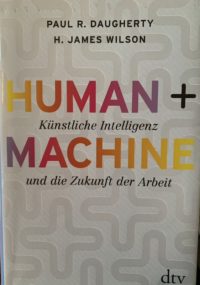
With Paul R. Daugherty and H. James Wilson, two of the leading technology experts from the consulting giant Accenture about the latest developments in the world of work. And her focus topic is the far-reaching Changes through artificial intelligence. And their book „Human + Machine“ clearly shows that these artificial intelligences have been around for a long time, communicating with us, making our lives easier, sometimes amusing us and often making them more difficult. But that is not the authors' focus.
(If you want to know more about the difficulties caused by artificial intelligence, algorithms and mass data processing, we recommend Cathy O’Neil, who sheds light on this area).
Daugherty and Wilson want to show that organisations and their employees, the world of work as a social and relationship system, are facing enormous changes. After all, these artificial machines do not work on their own, they have to be programmed, trained, fine-tuned and maintained, and people have to explain, demonstrate and show them what to do. In short, in the future, people will have to be able to help machines. People will become teachers for machines that want to be controlled in new ways. In addition, people will have to undergo further training in order to be able to utilise the support that machines can provide. It is not easy to be supported by artificial intelligence, you could say. For this development, Daugherty and Wilson have developed the Concept of the missing centre developed. In their book, they provide a wealth of examples from the corporate and working world for each area.
In order for this epochal change to succeed, the authors address five aspects on which the change must be based:
- Firstly, the Mindset adapt to the change and accept it.
- The Willingness to experiment, and taking risks is also one of the areas that organisations willing to change must face up to, especially if they are currently established and successful on the market.
- The entire Guidance system will change and adapt to the new circumstances.
- The Data foundation of action and decision-making will be further strengthened.
- And the Skills of employees will have to adapt and orientate themselves to technological developments.
The book deals with a specific area of digitalisation and is aimed at organisational workers, decision-makers and consultants. It is useful and very productive for them.
7 Life 3.0.
Being human in the age of artificial intelligence
Max Tegmark, Berlin 2017.
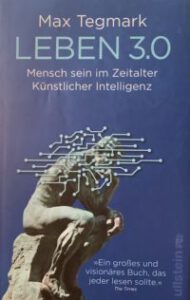
If it is true that the Digitalisation almost killed science fiction then Max Tegmark is a lifesaver! He brings science fiction back to life! The book reads like the crazy ideas of an LSD junkie reviving the hippie days.
But no, Max Tegmark is the son of Harold Shapiro, professor of mathematics at the Royal Institute of Technology in Stockholm and himself one of the most respected cosmologists and astro-scientists of our time. He himself studied at KTH Stockholm, graduating in economics in 1989 and physics in 1990, and at Berkeley University in California, where he received his master's degree in physics in 1992 and subsequently his doctorate. He then moved to Munich as a post-doctoral researcher at the renowned Max Planck Institute for Physics. From 1996 he was a Hubble Fellow at the Institute for Advanced Study in Princeton. Max Tegmark is now a full professor at the Massachusetts Institute of Technology (MIT). He is also the founding director of the Fundamental Questions in Physics Institute (FQXi) and one of the leading thinkers on the subject of artificial intelligence.
And with his book, he wants to stimulate the most important debate of our time and expressly invite everyone to get involved in good time. Much like Stephen Hawking and Yuval Noah Harari (see book no. 9 here in the blog post), he believes that artificial intelligence will influence the future of our planet like almost nothing before it and the only question is whether it will be our undoing or our next step in development.
In order to approach this question, Max Tegmark proceeds step by step and sketches out different scenarios, e.g,
- that AI takes on the role of conqueror and gets rid of humans,
- that AI has the role of an enslaved goddess used by humans to develop high technology,
- that AI in perfection will never materialise because humanity will destroy itself beforehand or
- that there will be an egalitarian utopia in which everyone lives happily side by side.
If that's too much of a book description for you, the following TED Talk as an introductionrecommended.
Max Tegmark: How artificial intelligence empowers us, not overwhelms us.
Max Tegmark, Lecture on Life 3.0 – Being Human in the Age of Artificial Intellegence
8. 21 Lessons for the 21st Century
21 lessons for the 21st century
Yuval Noah Harari, Frankfurt am Main 2018
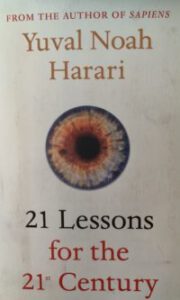
Yuval Noah Harari was already in 10 books on digital transformation that are worth reading represented. Firstly with his book on the yesterday of humanity, Sapiens, A brief history of mankindand with his book on the future of humanity, Homo Deus, A story of tomorrow.
In 21 Lessons for the 21st Century, Harari takes up many of the theses and debates already touched on in the two previous books and structures them into 21 chapters. In this way, he is able to present the individual theses, points of contention and argumentation patterns in a more focussed way and make them more digestible for the reader. These He divides 21 lessons into five parts: The technological challenge, the political challenge, hope and despair, truth and resilience.
Even if the book does not contain groundbreaking new insights and in this respect does not reach the quality of the first two books, this book is much more suitable than the others for approaching the topics step by step and in instalments. And this is all the more necessary as the density and intensity of Harari's own insights are particularly high in his books: With the historian's perspective, Harari not only brings new insights to light, but also does away with old prejudices and assumptions. His comments on emotions, for example, are simply refreshing, because they dispel any (counselling) mysticism and use the latest scientific findings to establish that they are simply biochemical algorithms that can soon be better recognised and assessed by sensors, machines and software than by other people, such as counsellors. The beginnings of these developments have long since left the laboratories (at MIT) and are now being utilised for (secondary scientific and primary commercial) applications: https://www.affectiva.com.
9. information growths – Growth is different.
From the smallest particles to people and networks.
César Hidalgo, Hamburg 2018.
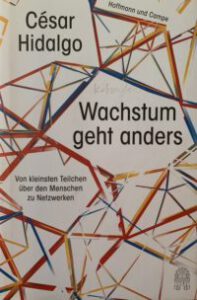
César Hidalgo is a young Chilean-born professor who started out as a physicist and became a science star after the New York Times 2011 reported that Hidalgo had developed a solution to an old but important problem: How do you turn a poor country into a rich one? …and which is now shaking up the world of economics. And Hidalgo always presents himself in jeans and a T-shirt. But anyone who watches one of Hidalgo's speeches on the Internet will realise that this is someone who is passionate and persistent about understanding how the world turns.
Hidalgo is not satisfied with trivialities. For him, the universe is made up of three things: Energy, matter and information. And information is the central concept for Hidalgo because it makes the universe interesting. His book is also called Why Information Grows. The Evolution of Order, from Atoms to Economies, so that the German title is a little misleading or at least does not address the central aspect, even though growth plays an important role.
This is because things are different on Earth than in the universe: while disorder is constantly increasing there (entropy!), it is decreasing on Earth. Here, order – is constantly growing. This increase in order goes hand in hand with an increase in complexity. For Hidalgo, the principle of growth is the fundamental principle on earth, so that his theory encompasses the biosphere and social systems, e.g. the economy as well as the international legal system and the digital networking of people and machines with each other.
As humans, we may see disorder and danger, but this is merely the consequence of not having an overview of complexity and not (yet) mastering the tools with which we can make it manageable.
Tip: In order to understand Hidalgo's core theses – or to better approach them from a different angle, it is worth referring to the book by the recently deceased Hans Rosling „Factfullness“ that traces the order and beauty of this world, its growth and development over the past 50 years in a way that everyone can immediately understand. To feel good and connected to this world, you don't need much more than the underlying facts, figures and data.
10. The 50 most important topics in digitalisation.
Artificial intelligence, blockchain, Bitcoin, virtual reality and much more clearly explained
Philip Specht, Frankfurt am Main 2017.
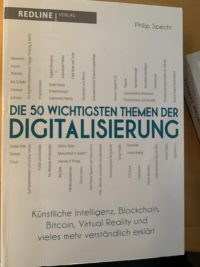
At the end the Introduction to the topic of „digitisation“.
Philip Specht briefly and concisely explains the 50 most important terms and contexts of digitalisation. He moves from the basics such as bits and bytes, the World Wide Web and venture capital, to online trends and online sales, to VR, AR, AI and 3D printing, before moving on to questions of identity and homo sapiens in the context of smart homes and smart health.
The book is worth reading because it covers the breadth of the topic and thus makes it clear that it is not just about technology and engineering, not just about money and capital, but about fundamental questions of a global and world-historical nature.
These were my 10 books on digital transformation from the past 2-3 years that are worth reading.
Which book is missing from the list? What has brought you closer to digital transformation?
Let us know in the comments and feel free to share this article in your network – as I said, it's about the most important debate of our time!
Best regards!
S

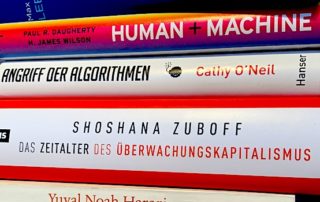



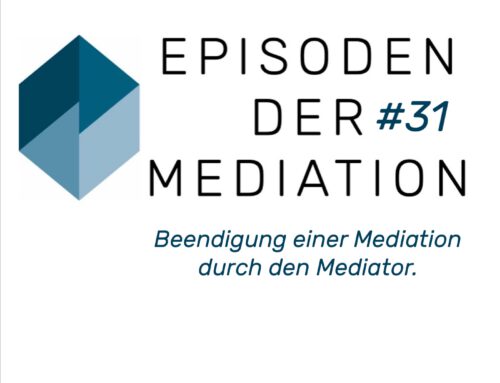
Leave A Comment